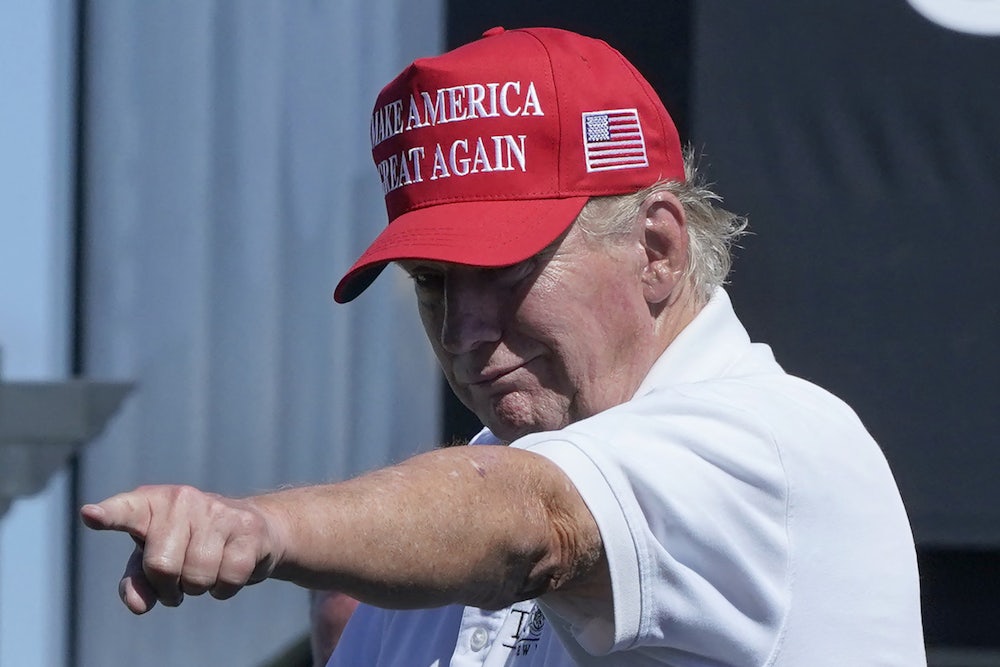Every presidential election is billed as the most important of our lifetime. But in 2020, voters seemed to actually believe it. Amid the Covid-19 pandemic and Donald Trump’s growing authoritarianism, that election saw record turnout. More than two-thirds of eligible voters cast ballots, with both candidates receiving record totals: Trump received 12 million more votes than he did four years earlier—and still lost the election to Joe Biden by more than seven million.
In six months, voters will again choose between the two, and again the result will have existential significance. Trump is openly campaigning on an authoritarian platform, promising to purge the federal government of those deemed disloyal to his political project and, more subtly, expressing a desire to quash the criminal charges leveled against him over the past year. There’s also a well-founded fear that a second Trump presidency could result in a national abortion ban, and perhaps even tilt the Supreme Court’s 6-3 conservative majority further to the right. These issues will all be on the ballot in November.
But voters don’t seem to care. Faced with what might actually be the most consequential election of our lifetime, the electorate is largely responding with a collective yawn—or worse, a grimace. And it’s difficult to blame them.
According to an NBC News poll released on Sunday, interest in the presidential race just hit a 20-year low. Only 64 percent of voters indicated a “high” degree of interest in the contest, down from 77 percent in July 2020. The numbers for young voters—aged between 18 and 34—are particularly bleak: Only 34 percent have a high interest in the election. “They just aren’t low interest,” Republican pollster Bill McInturff told NBC. “They are off-the-charts low.” Majorities, meanwhile, have negative opinions about both candidates.
Like the 2020 election, which took place during a global pandemic, the 2024 election is unprecedented. It will be the first presidential election in which one of the candidates is facing multiple criminal trials; it may very well be the first in which one of the candidates is a convicted felon. It will be the first presidential election in which the candidates from the two major parties have occupied the White House before. And it will—like 2020 before it—feature the two oldest presidential candidates in American history.
Unlike in 2020, however, the unprecedented aspects of the 2024 election help explain what most voters hate about it. Biden and Trump are both known entities, and thus neither can honestly claim to be the candidate of change. Yes, Trump is promising to upend the federal government and remake it in his image, but his brand of chaos is familiar to voters. In 2016, he ran as a genuine outsider and as a bull in the Washington china shop—then failed to deliver on his promise to destroy the old political order. Aside from a commitment to tariffs and to lengthy, middle-of-the-night tweetstorms, he largely governed as a bog-standard Republican. His signature achievement in office was, after all, a large corporate tax cut.
Biden won in 2020 in large part by promising to end the chaos that defined Trump’s presidency and steer America out of the pandemic. He assured America that he would be predictable, even boring, and he has delivered. His signature legislative accomplishment is a massive (bipartisan) infrastructure bill—classic roads-and-bridges spending. He has largely governed by consulting his cabinet and leading Democrats in Congress. The unemployment rate is historically low, the stock market historically high.
But Biden has been bedeviled by chaos he didn’t create, and voters are punishing him for it: two foreign wars, in Ukraine and Gaza, and steep inflation from pandemic-era supply shocks. Biden has handled Ukraine well, and defied expectations in taming inflation. But his decision to continue to back Prime Minister Benjamin Netanyahu’s far-right government as Israel relentlessly bombs Palestinians has divided the Democratic coalition and rightly angered young voters who are, in some polls, backing Biden and Trump in roughly equal numbers.
This election should be ripe for a third-party candidate. Theoretically voters want an alternative. But any effort to find a normal alternative has failed. Robert F. Kennedy, the leading independent candidate, is a conspiracy theorist whose main demographic is anti-vaxxers—and maybe a few people who like brand name but haven’t actually looked under the hood yet. The other candidates, Jill Stein and Cornel West, are both fringe candidates who aren’t trying to run mainstream campaigns. (The Libertarian Party has not yet selected its nominee but can be counted on to choose someone weirder than RFK, Stein, and West put together.)
Presidential elections are about presenting alternative visions of the future. Challengers make bold promises about a reimagined federal government under their leadership. Incumbents both defend their record and make the case that the country will nosedive if their challenger is elected. Third-party candidates build coalitions among disaffected voters that, if nothing else, force a correction by the major-party candidates. This election has none of that. Voters know what to expect from both candidates. They are sick of both candidates, but hardly flocking to the lesser-known options. There is nowhere else to go. And there are still six months of this.






